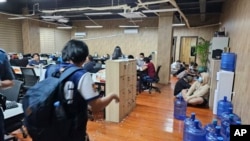Journalists reporting on illicit activity connected to the billion-dollar scam center industry in Cambodia say they are facing security risks.
Physical and online harassment, surveillance and legal threats related to media coverage have all been reported by local and foreign journalists.
Reporting on the centers, along with the associated allegations of fraud, human trafficking and other abuses is becoming a "risky endeavor," said American freelancer Danielle Keeton-Olsen.
Details of the scam centers operating throughout the Southeast Asia region, including Cambodia, are outlined in a May report by the United States Institute of Peace, or USIP.
In Cambodia alone, the USIP report found 100,000 scammers generating an estimated $12.8 billion in 2023 — close to half the country's formal GDP. Most compounds that house the scammers are operated by Chinese gangs, though some are allegedly linked to local elites, the report found.
Those working in the centers are often lured into phony business ventures, becoming victims themselves. Reports have highlighted evidence of human trafficking.
VOA contacted the Cambodian government by email and phone but didn't receive a reply.
But Chou Bun Eng, deputy chair of the government's police-led National Committee for Counter Trafficking said earlier this year that 80% of cases alleging human trafficking are "false."
Journalists reporting on the centers say they've been harassed and, in one case, detained.
Journalists risk physical harm
Cambodian journalist Mech Dara says police detained him while he was investigating a scam center in the city of Sihanoukville. At the time, Dara worked for the now shuttered Voice of Democracy, or VOD.
Keeton-Olsen also reported on the scam centers for VOD English.
"We would go around in a site in Sihanoukville and try to figure out everything that we could, get some eyewitness testimonies, try to, like, assert who the ownership is and triangulate from there. That was a really risky endeavor," she told VOA.
"There were some close calls, you could get scolded by a security guard or just in general the hair standing up on the back," she said.
While journalists often face difficulties accessing information in Cambodia, they risk the possibility of physical harm reporting on scam centers.
"It's a dangerous industry, and there's evidence that there are gangs involved," she said. "There's evidence of violence happening toward workers or people associated with it. In terms of threats to safety [for journalists], they definitely exist."
With one story, said Keeton-Olsen, a company threatened them with legal action.
"We actually ended up writing about that for VOD because [the company] came in and they were saying 'we might serve you with a legal letter,' so my editor wrote a story about it," she said.
Nathan Paul Southern, a Scottish journalist based in Phnom Penh, said he also received threats.
"We've been told by people who are connected to the government that we do need to watch our backs, that we are in danger," he told VOA. "We have been followed quite a few time ... [and] we've had a few physical altercations in and around the scam centers, where essentially various different gangsters have tried to grab us or stop us from leaving and get close to violent with us."
Thousands 'held against their will'
While reporting on an online gambling site working out of a compound in the city of Bavet, Southern said he learned that "thousands of people were being held against their will."
The company denied the allegations, he said, then served him with a cease-and-desist letter.
"It seemed it was to scare us financially," he said. "Most of it, whether that's from the criminal groups or the government, has been them letting us know that they're watching us."
Risks associated with scam center reporting add to an already tough reporting environment, where government officials have cracked down on independent media.
"Journalism continues to be a dangerous profession in Cambodia," said Aleksandra Bielakowska, advocacy officer at Reporters Without Borders, also known as RSF.
"Reporters can be arrested and sometimes spend months in prison on trumped-up charges of 'terrorism,'" she told VOA. "At the same time, covering corruption cases that directly or indirectly implicate the government has become virtually impossible."
The country ranks 151 out of 180 on the RSF World Press Freedom Index, where 1 signals a good media environment. In the past year, three media outlets were stripped of their licenses, including VOD.
